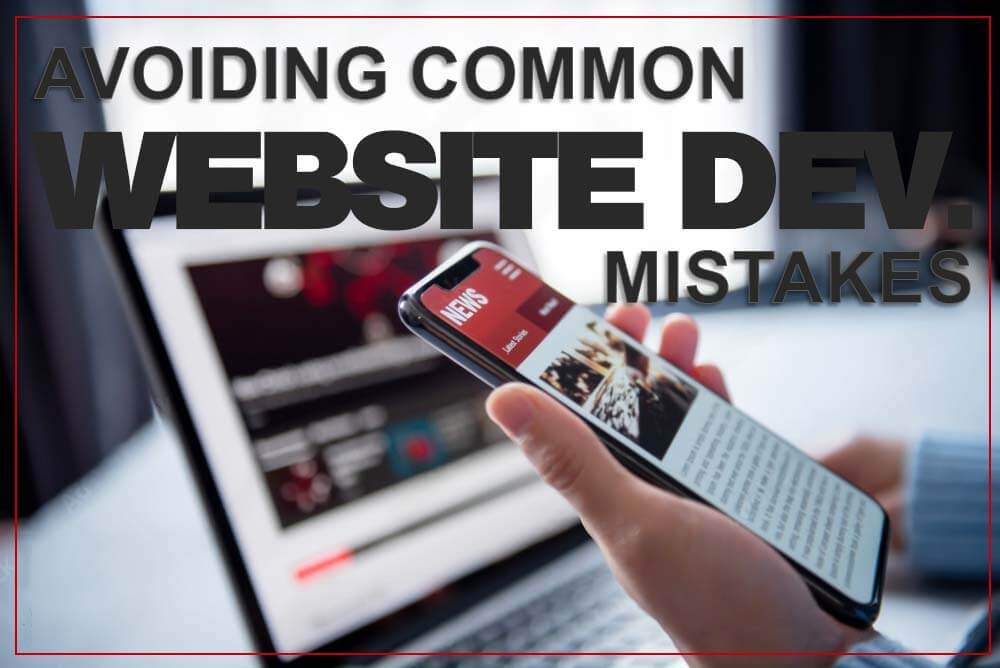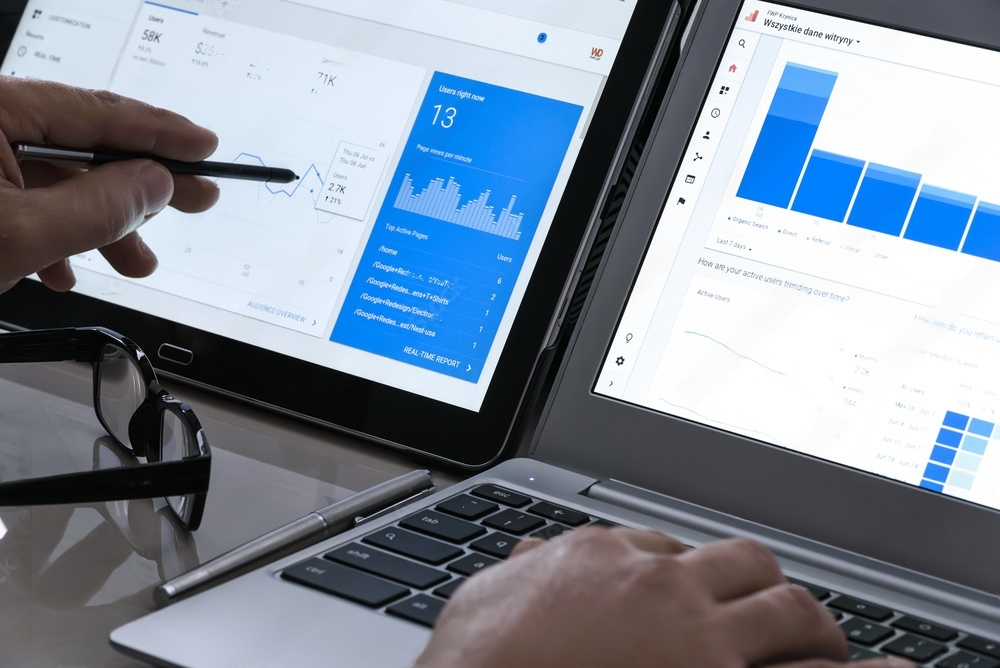
Top 10 Mistakes That Are Related To Website Development Made By Small Business Owners
Hey there, fellow small business owner! If you're reading this, chances are you're either just starting out on your entrepreneurial journey or you're a few steps down the road and have hit a few bumps along the way. Either way, I've been there and I know how it feels. You have all these big dreams and ideas, but sometimes it feels like the website development part of it all is just too overwhelming.
Well, I wish I could go back in time and tell my younger self about all the mistakes I've made in the website development process for my small business. But since time travel isn't a thing yet, I'll just have to settle for sharing my wisdom with you. Trust me, these are mistakes you'll want to avoid, so keep reading to find out the top 10 website development mistakes that small business owners make, and how to avoid them.
#10: Not having a clear message or call to action.

One of the most common mistakes that small business owners make when developing their website is not having a clear message or call to action. I know, I know, it sounds simple enough, but trust me, it's a trap that's easy to fall into. When you're so close to your business, it's easy to assume that everyone knows what you do and why they should care. But the truth is, unless you spell it out for them, they probably don't.
Your website should have a clear message that tells visitors what you do and why they should care. It's like the elevator pitch of your website. It needs to be short, sweet, and to the point. It should be easy for visitors to understand what you do, and why they should care about it, within seconds of landing on your website. If it takes them longer than that, they're likely to click away, and you've lost them.
Make sure to include a call to action that encourages visitors to take the next step, whether it's contacting you, making a purchase, or signing up for a newsletter. Your website should be designed to guide visitors towards taking action, and a clear call to action is a crucial part of that. It's like a signpost that tells visitors where they need to go next. It's what separates a website that's just there to look pretty, from a website that's designed to generate leads and sales. So make sure that your website has a clear message and call to action, and watch your business grow.
#9: Not optimizing for mobile devices.

Not optimizing for mobile devices is another common mistake that small business owners make when developing their website. Nowadays, it's no secret that more and more people are accessing the internet on their smartphones and tablets. In fact, according to recent statistics, mobile devices account for over half of all web traffic. So, if your website isn't optimized for mobile devices, you're potentially missing out on a whole bunch of potential customers.
To optimize your website for mobile devices, it should be easy to navigate and read on a small screen. This means that your website should be designed with a responsive layout, so that it automatically adjusts to fit the size of the screen it's being viewed on. You should also make sure that the text is large enough to be easily read, and that the buttons and links are big enough to be easily tapped with a finger.
Additionally, it should load quickly on a slow internet connection. Slow loading times can be frustrating for mobile users, and it's essential that your website is optimized to load as quickly as possible. This means compressing images, using a content delivery network (CDN), and minimizing the amount of code on your website.
#8: Not having a clear navigation

Navigation is one of the most important elements of a website, as it helps visitors to find what they're looking for. A clear and intuitive navigation menu can make it easy for visitors to find what they're looking for, and it can also help to improve the overall user experience of your website.
If your website's navigation is confusing or hard to find, visitors may become frustrated and leave your website without taking any action. A clear navigation menu should be easy to find, and it should be organized in a logical way. It should also include links to all of the most important pages on your website, such as your contact page, your about page, and your products or services page.
#7: Not using web analytics

Web analytics are a powerful tool that can help you understand how visitors interact with your website, what pages they visit, how long they stay, and where they came from. This information can help you to identify problems with your website, such as pages that have a high bounce rate or pages that are not converting visitors into customers.
Without web analytics, it's difficult to know what is working and what isn't on your website. You may think that a certain page is performing well, but if you don't have data to back it up, you won't know for sure. Additionally, web analytics can help you to identify which marketing strategies are working and which ones are not, allowing you to optimize your marketing efforts and get the best results.
Not using web analytics can also make it difficult to set and achieve your website's goals. For example, if you want to increase your website's conversion rate, you need to know what your current conversion rate is before you can set a goal and create a plan to achieve it.
#6: Not keeping the website up-to-date

A website that is not kept up-to-date can quickly become stale and uninteresting to visitors. It can also give the impression that your business is not active or that you don't care about your website. This can lead to visitors leaving your website quickly and not returning.
Keeping your website up-to-date can help to keep visitors engaged and coming back to your website. You can do this by regularly updating your website with fresh content, new products or services, and new features. For example, you can add new blog posts, update your portfolio, or add new product or service pages. This can help to keep your website relevant and interesting to visitors.
You should also keep your website up-to-date from a technical standpoint. For example, you should make sure that your website is running on the latest version of the software it was built on, that all plugins are up-to-date, and that your website is secure from hacking attempts. All of these can help to ensure that your website is running smoothly and that it is not vulnerable to hacking attempts.
#5: Not making it easy to contact you.

Your website should make it easy for visitors to contact you. This means that your contact information should be prominently displayed on your website and that you should have a contact form that visitors can fill out to send you a message.
When visitors come to your website, they should be able to find your contact information quickly and easily. This means that your phone number, email address, and physical address should be prominently displayed on your website, ideally in the header or footer of your website so that it is visible on every page. You should also make sure that your contact information is up-to-date and that it is accurate.
In addition to displaying your contact information prominently on your website, you should also have a contact form that visitors can fill out to send you a message. This contact form should be easy to find and easy to use. It should also have clear instructions on what information visitors should include in their message. This can help to ensure that you receive relevant and useful messages from visitors.
#4: Not investing in search engine optimization (SEO)

This is a mistake that far too many small business owners make, and it can have a significant impact on the success of their website. SEO is the process of optimizing your website to rank higher in search engine results. This means making sure your website is structured in a way that search engines can easily understand, and that it contains relevant, high-quality content that is valuable to your target audience. Without proper SEO, your website may be buried on page 10 of Google results, making it difficult for potential customers to find you.
One of the biggest reasons small business owners make this mistake is that they simply don't understand how SEO works. They may think that building a website is all they need to do to be found online, but that's not the case. SEO is an ongoing process that requires ongoing investment and attention.
Another reason small business owners may not invest in SEO is that they don't see the immediate return on investment. It can take time for SEO efforts to pay off, and that can be frustrating for small business owners who are used to seeing immediate results from their marketing efforts.
But the truth is, SEO is one of the most important investments a small business can make when it comes to their website. It's an investment in your online visibility and in the long-term success of your business. Without it, your website will struggle to be found by potential customers, and that can have a significant impact on your bottom line.
So, if you're a small business owner and you're not investing in SEO, it's time to change that. Invest in the long-term success of your business and make sure your website is properly optimized for search engines.
#3: Not testing the website before launch

Testing your website before launch is essential to ensure that it is functioning properly and that there are no bugs or errors. It's important to test the website on different browsers, devices, and screen sizes to make sure it looks and works correctly for all users. Failure to test the website can result in a poor user experience, which can negatively impact the credibility and success of your business.
It is also important to test the website's load time and to make sure that it is optimized for speed. A slow-loading website can be frustrating for visitors and can lead to a high bounce rate, meaning that visitors leave the website quickly. This can also negatively impact your search engine rankings, as search engines tend to favor fast-loading websites.
It's also important to test the website's forms and checkout process to ensure that they are working properly. Nothing is more frustrating for a customer than trying to complete a purchase or contact you only to find out that the form is not working. This can result in lost sales and lost customer trust.
#2: Not using social media

Now, I know what you might be thinking, "But I'm not a social media expert, and I don't have time to constantly update my accounts." And I get it, running a small business can be a full-time job in and of itself. But hear me out, social media is a powerful tool for connecting with customers and promoting your business, and it's important to make sure to use it to your advantage.
First off, let's talk about promoting your website. When you post on social media, you're putting your website in front of a whole new audience. Plus, if your posts are interesting or valuable, people will want to check out your website to learn more. And the best part? It's free advertising. You don't have to pay a dime to get your website in front of new people.
But social media is about more than just promoting your website, it's also about engaging with your customers. Social media allows you to build a relationship with your customers and create a sense of community around your brand. By responding to comments and messages, you're showing your customers that you care about them and their experience with your business. Plus, social media allows you to get feedback from your customers, which can help you improve your products and services.
So, in short, not using social media is a mistake because it's a free and effective way to promote your website and engage with your customers. And trust me, as someone who's been in the small business game for a while, those two things are invaluable.
#1: Not investing in professional design

Not investing in professional design is a mistake that small business owners often make. They may think that they can save money by doing it themselves, or they may not realize the importance of a well-designed website. However, there are several reasons why this is a mistake that should be avoided at all costs.
First and foremost, a professional design can make a huge difference in the way your website is perceived by visitors. It can give your business credibility and make it stand out from the competition. A poorly designed website can make your business appear unprofessional and unimportant. A professional design can also make it easier for visitors to navigate your website, find the information they need, and take the desired action.
Secondly, investing in professional design can help to increase conversions. A well-designed website can make it easier for visitors to find what they are looking for and can encourage them to take the desired action. A professional designer can help to create a website that is optimized for conversions, making it more likely that visitors will contact you, make a purchase, or sign up for a newsletter.
Thirdly, a professional design can help to improve your search engine rankings. A well-designed website that is optimized for search engines can help to improve your search engine rankings, making it more likely that people will find your website when they are searching for products or services like yours.
In conclusion, not investing in professional design is a mistake that small business owners often make. It can make a huge difference in the way your website is perceived by visitors, can help to increase conversions, and can improve your search engine rankings. So, if you're a small business owner, don't make the mistake of skimping on professional design. It's worth the investment.
Wrapping It Up:

Running a small business can be incredibly rewarding, but it can also be challenging. One of the biggest challenges is creating and maintaining a website that effectively promotes your business and attracts customers. Unfortunately, many small business owners make the mistake of neglecting key elements of their website, which can have a significant impact on their ability to generate leads and sales.
In this article, we've highlighted some of the most common mistakes that small business owners make when it comes to their website. From not having a clear message or call to action, to not investing in professional design, search engine optimization, and social media, these mistakes can all have a negative impact on your website's ability to generate leads and sales.
However, it's important to remember that you don't have to make these mistakes on your own. There are plenty of free tools and resources available to help you create and optimize your website, including our free SEO and page tester. And if you're looking for professional assistance, we'd be more than happy to help. Our team of award-winning professionals has years of experience in website design, development, and marketing, and we can help you create a website that effectively promotes your business and attracts customers. So, if you're ready to take your small business to the next level, don't hesitate to reach out to us today!





